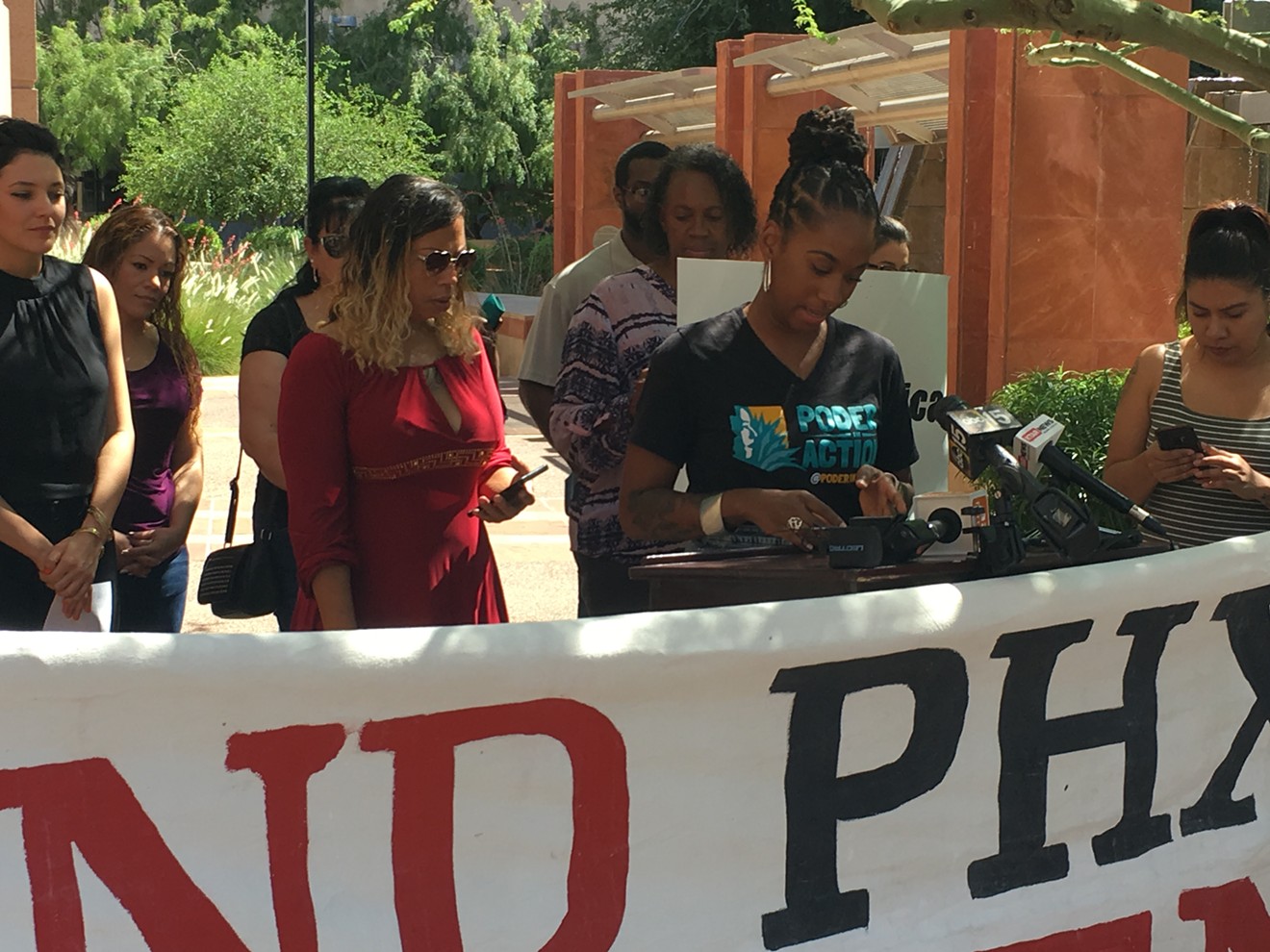The Phoenix Police Department suspended an officer who performed an unwarranted body cavity search on a 37-year-old black mother in violation of department policy, according to a press statement.
The police narrative did not name the female officer who conducted the search, reveal the length of the suspension (which began in February), or say whether the officer was paid during her disciplinary period. It did not use the phrase "body cavity search," opting instead for "thorough search."
The statement also failed to answer accusations that officers orchestrated a cover-up of the alleged sexual assault of Erica Reynolds, the details of which are outlined in a notice of claim filed Monday.
Reynolds, represented by attorneys Heather Hamel and Steve Benedetto, is seeking $12.5 million in damages over the body cavity search, which she said caused her severe emotional distress despite turning up no evidence of a crime, according to her claim.
In addition to announcing the suspension of an officer, the Phoenix Police Department's Monday statement emphasized that Reynolds is a "a criminal suspect in an 18-month long investigation involving numerous criminal defendants, illegal drug sales and conducting a criminal enterprise."
Reynolds' attorneys criticized the police response to their notice of claim as nontransparent.
"As predicted in our notice of claim, the statement appears to aim squarely at publicly justifying the officers’ conduct by arguing that Erica Reynolds broke the law," Benedetto said in an email. "In doing so, Phoenix PD seems to be telling the public (and, more concerningly, its officers) that a mere suspicion that a citizen breaks the law is sufficient to justify its officers in violating the constitution."
The situation began on December 26, when Phoenix police surveilled Reynolds meeting with Charles Riggins, the suspected leader of a criminal drug ring. After the meeting, officers pulled Reynolds over and claimed to smell marijuana in her car.
They searched her vehicle, patted her down, and brought out a drug-sniffing dog. None of those procedures turned up any drugs. Still, the officers took her to a substation where they asked her to strip naked and bend over, her claim states. A female cop used her fingers to probe Reynolds' anus and vagina.
"As the officer inserted multiple unlubricated fingers into Erica’s anus, probing her rectum, the tears flowed," according to Reynolds' claim. "And as the officers aggressively poked and prodded a hemorrhoid, Erica yelped in pain."
Phoenix police described the incident differently.
"Having reason to believe Ms. Reynolds possessed illegal drug evidence on her person, officers requested a female police officer to perform a through [sic] search of Ms. Reynolds," agency spokesperson Mercedes Fortune said.
The search of Reynolds as described in her claim appears to flagrantly violate department policy on "strip searches." According to the Phoenix Police Department's operations order, cavity searches can only be conducted with a warrant and approval from a high-ranking officer. The policy also requires a medical professional to perform the procedure.
Reynolds was arrested on February 6 — about six weeks after the body cavity search — on suspicion of multiple felonies related to a suspected drug ring. At the time, Reynolds had already filed a complaint over the incident and followed up multiple times. She had also addressed the allegation in a public Facebook video.
According to police, Reynolds admitted on February 6 to "purchasing illegal drugs and possessing illegal drugs" on December 26, the same day as the cavity search.
The Phoenix Police Department forwarded a case to the Arizona Attorney General's Office on February 7, according to a probable cause statement.
Since then, prosecutors have not filed charges against Reynolds, though they have pursued cases against at least 20 other defendants for their alleged involvement in the drug ring.
In her claim, Reynolds' attorneys said the real reason for Reynolds' arrest on February 6 was to thwart her plans to speak out about her body cavity search during a City Council meeting that same day. Attorneys Hamel and Benedetto also alleged that police coerced Reynolds into giving a confession during a six-hour interrogation.
The filing accuses the Phoenix Police Department of failing to document the the cavity search in police reports, ignoring a complaint she filed and subsequent follow-ups, and instructing nurses not to perform a rape kit evaluation on Reynolds when she asked for one.
The statement from spokesperson Fortune acknowledged a complaint from Reynolds on December 27, but did not address allegations that it ignored follow-ups. Fortune also did not address the other allegations related to an alleged cover-up.
[
{
"name": "Air - MediumRectangle - Inline Content - Mobile Display Size",
"component": "18478561",
"insertPoint": "2",
"requiredCountToDisplay": "2"
},{
"name": "Editor Picks",
"component": "16759093",
"insertPoint": "4",
"requiredCountToDisplay": "1"
},{
"name": "Inline Links",
"component": "17980324",
"insertPoint": "8th",
"startingPoint": 8,
"requiredCountToDisplay": "7",
"maxInsertions": 25
},{
"name": "Air - MediumRectangle - Combo - Inline Content",
"component": "16759092",
"insertPoint": "8th",
"startingPoint": 8,
"requiredCountToDisplay": "7",
"maxInsertions": 25
},{
"name": "Inline Links",
"component": "17980324",
"insertPoint": "8th",
"startingPoint": 12,
"requiredCountToDisplay": "11",
"maxInsertions": 24
},{
"name": "Air - Leaderboard Tower - Combo - Inline Content",
"component": "16759094",
"insertPoint": "8th",
"startingPoint": 12,
"requiredCountToDisplay": "11",
"maxInsertions": 24
}
]












